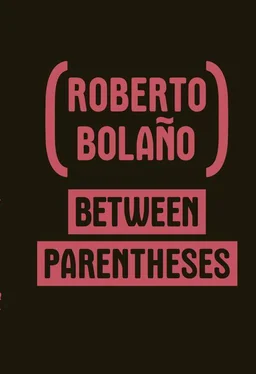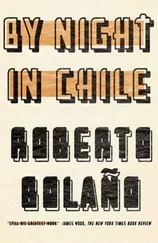Roberto Bolaño - Between Parentheses - Essays, Articles and Speeches, 1998-2003
Здесь есть возможность читать онлайн «Roberto Bolaño - Between Parentheses - Essays, Articles and Speeches, 1998-2003» весь текст электронной книги совершенно бесплатно (целиком полную версию без сокращений). В некоторых случаях можно слушать аудио, скачать через торрент в формате fb2 и присутствует краткое содержание. Год выпуска: 2011, Издательство: New Directions, Жанр: Публицистика, Критика, на английском языке. Описание произведения, (предисловие) а так же отзывы посетителей доступны на портале библиотеки ЛибКат.
- Название:Between Parentheses: Essays, Articles and Speeches, 1998-2003
- Автор:
- Издательство:New Directions
- Жанр:
- Год:2011
- ISBN:нет данных
- Рейтинг книги:4 / 5. Голосов: 1
-
Избранное:Добавить в избранное
- Отзывы:
-
Ваша оценка:
- 80
- 1
- 2
- 3
- 4
- 5
Between Parentheses: Essays, Articles and Speeches, 1998-2003: краткое содержание, описание и аннотация
Предлагаем к чтению аннотацию, описание, краткое содержание или предисловие (зависит от того, что написал сам автор книги «Between Parentheses: Essays, Articles and Speeches, 1998-2003»). Если вы не нашли необходимую информацию о книге — напишите в комментариях, мы постараемся отыскать её.
The Savage Detectives
Between Parenthese
Between Parentheses: Essays, Articles and Speeches, 1998-2003 — читать онлайн бесплатно полную книгу (весь текст) целиком
Ниже представлен текст книги, разбитый по страницам. Система сохранения места последней прочитанной страницы, позволяет с удобством читать онлайн бесплатно книгу «Between Parentheses: Essays, Articles and Speeches, 1998-2003», без необходимости каждый раз заново искать на чём Вы остановились. Поставьте закладку, и сможете в любой момент перейти на страницу, на которой закончили чтение.
Интервал:
Закладка:
JAVIER CERCAS'S NEW NOVEL
It’s called Soldiers of Salamis (Tusquets, 2001) and the narrator is someone by the name of Javier Cercas, who clearly isn’t the Javier Cercas I know and with whom I often have long conversations on the most unusual subjects. The man I know is married, has a child, his father is still living. Meanwhile, the narrator of Soldiers of Salamis introduces himself like this, at the very start of the novel: “Three things had just happened: first my father had died; then my wife had left me; finally, I’d given up my literary career.” These three statements are false, or rather, in this combination of possibilities that we call reality, they’re false, although in some other configuration of reality, or of nightmare logic, they’re probably true. The hypothetical Cercas is preparing a piece on the writer Sánchez Mazas, an entirely real character who was one of the founding fathers of Spanish fascism.
Everything we’re told about Sánchez Mazas in the novel cleaves strictly (although with Cercas nothing is strict) to historical fact: Sánchez Mazas’s early years, his books, his friends, his political activities, his misfortunes. Then comes the Civil War and the writer is imprisoned in the Republican zone. The incident that sparks the novel comes at the end of the war and today it may strike us as an unusual story (or not), but in those days it was a common and brutal practice: Sánchez Mazas and a group of nationalist prisoners are taken to a small Catalan town and shot. They’re all killed, except for Sánchez Mazas, who escapes and is pursued without much enthusiasm. At some point, one of the soldiers who’s giving chase finds him hidden in the bushes. The leader of the group asks whether the soldier sees anything. The Republican soldier looks at Sánchez Mazas, looks him in the eye, and says there’s no one here. Then he turns around and goes.
The second part of the novel tells the story of Sánchez Mazas (whose only positive quality, in my view, is that he fathered Sánchez Ferlosio, one of the best Spanish prose writers of the twentieth-century) and the endless intellectual disillusionment of the Spanish Falangists, which never translated into productive discontent.
The third part centers on the unknown Republican soldier who saved Sánchez Mazas’s life, and here there appears a new character, someone by the name of Bolaño, who is a writer and Chilean and lives in Blanes, but who isn’t me, in the same way that the narrator Cercas isn’t Cercas, although both characters are possible and even probable. Through this Bolaño the reader learns the story of Miralles, a soldier, who, as he retreated, passed the place where the Falangists were killed and Sánchez Mira was nearly killed, and who later crossed the border into France and spent a while in a concentration camp on the outskirts of Argèles, and who, to escape the camp, enlisted in the French Foreign Legion, and who, after the fall of France in 1940, followed General Leclerc on his great march from the Maghreb to Chad, and who took part in several battles against the Italians and the Afrika Korps, and who then, assigned to the French 2nd Armored Division, fought in the battle of Normandy and entered Paris and then fought near Strasbourg until a mine, in German territory, put an end to his war, if not his life. The search for this Miralles, whom Bolaño got to know over the course of three summers at a campground near Barcelona, becomes the key to the novel. Of course, Cercas doesn’t know (nor does his friend) whether Miralles is alive or not. All he knows is that he lived in Dijon, that he had acquired French citizenship, and that now he must be past eighty or dead. The third part of the novel is the search for Miralles. If he really is the soldier who chose not to kill Sánchez Mazas, Cercas has just one question for him: Why not?
With this novel, published to critical acclaim and appearing in French and Italian translations a few days before it even landed in Spanish bookstores, Javier Cercas joins the small group at the leading edge of Spanish fiction. His novel flirts with hybridization, with the “relato real,” or “true fiction” (which Cercas himself invented), with historical fiction, and with hyper-objective fiction, though whenever he feels so inclined he has no qualms about betraying these generic categories to slip toward poetry, toward the epic without the slightest blush: in any direction, so long as it’s forward.
BRAQUE: ILLUSTRATED NOTEBOOKS
Braque was seventy years old in 1952, when Illustrated Notebooks was published by Gallimard, a book scarcely one hundred pages long that is now being issued in Spanish by the publishing house El Acantilado. The least that can be said of it is that it’s a precious book, in the literal sense of the word, composed of notes, reflections, and aphorisms that the painter tossed off between 1917 and 1952 — obviously they are anything but his principal occupation, which is precisely what makes them so interesting, what gives the book the aura of a secret project, never exclusionary but always exacting.
Braque, along with Juan Gris and Picasso, made up the holy trinity of cubism, in which the role of God the Father belonged wholly to Picasso and the role of the Son to the surprising and still misunderstood Juan Gris — who in a different production could easily have played a Cyclops — whereas fate reserved for Braque, the only Frenchman of the trio, the role of the Holy Spirit, which as we know is the most difficult of all and the one that gets the least applause from the audience. The Illustrated Notebooks seem to testify to this, with notes like the following: “In art no effect can be achieved without straining the truth.” “The artist is not misunderstood; he’s unrecognized. People exploit him without knowing it.” “We will never have repose. The present is perpetual.”
Some of his aperçus, like Duchamp’s or Satie’s, are infinitely superior to those of many writers of his day, even some writers whose main occupation was to think and reflect: “Every age limits its own aspirations. This is what gives rise, not without complicity, to the illusion of progress.” “When all is said and done, I prefer those who exploit me to those who follow me. The former have something to teach me.” “Action is a series of desperate acts that allow one to maintain hope.” “It’s a mistake to wall off the unconscious on the fringes of reason.” “You must choose: a thing cannot be true and likely at the same time.”
At once a humorist and a pessimist (in the same way that he’s simultaneously a man of faith and a materialist, or that he seems to move too fast when he’s really as motionless as a mountain or a turtle), Braque offers us these gems: “Memory of 1914: Joffre’s only concern was to recreate Vernet’s battle paintings.” “Whatever is not taken from us remains with us. It is the best part of ourselves.” “As you grow older, art and life become one and the same.” “Only the one who knows what he wants is wrong.”
The book closes with an appendix of no little interest, the near-manifesto “Thoughts and Reflections on Painting,” published in Nord-Sud Number 10, in 1917. But I’d rather bid farewell to this magnificent book with one of its many triumphs: “Be wary: talent is prestigious.”
IL SODOMA
Giovanni Antonio Bazzi, called Il Sodoma, was born in 1477 and died in 1549. I first heard of him from Pere Gimferrer, who not only is a great poet but has read practically everything. We were talking about a story called “Sodoma” and Gimferrer asked me whether it was about the Biblical city or the painter. The city, of course, I answered. I had never heard of a painter called Sodoma. For a moment I thought Gimferrer was joking, but no, Il Sodoma really existed, and even Giorgio Vasari devoted a few pages to him in his canonical tome, Lives of the Most Excellent Painters, Sculptors, and Architects . His name, Il Sodoma, alludes clearly to his sexual preferences.
Читать дальшеИнтервал:
Закладка:
Похожие книги на «Between Parentheses: Essays, Articles and Speeches, 1998-2003»
Представляем Вашему вниманию похожие книги на «Between Parentheses: Essays, Articles and Speeches, 1998-2003» списком для выбора. Мы отобрали схожую по названию и смыслу литературу в надежде предоставить читателям больше вариантов отыскать новые, интересные, ещё непрочитанные произведения.
Обсуждение, отзывы о книге «Between Parentheses: Essays, Articles and Speeches, 1998-2003» и просто собственные мнения читателей. Оставьте ваши комментарии, напишите, что Вы думаете о произведении, его смысле или главных героях. Укажите что конкретно понравилось, а что нет, и почему Вы так считаете.












